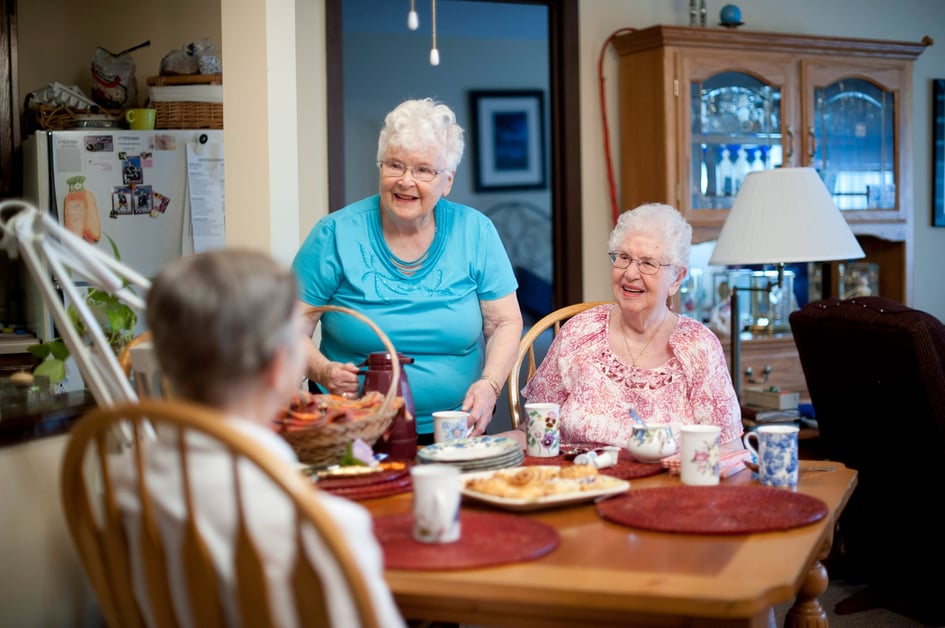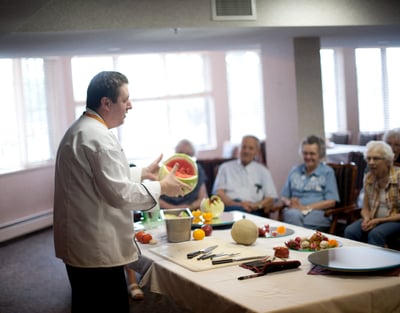Food for the soul: Special dietary needs of seniors
Walker Methodist | Feb 22, 2022

What do you think of when you hear the word “sustenance”? Merriam-Webster defines sustenance as “food and nourishment” but also as any necessity that provides support, maintenance, and strength.
Seniors benefit deeply from nourishing foods, but they also benefit from lively company around the dining table. At Walker Methodist, we strive to provide not only a balanced and thoughtful diet but the mental stimulation and joy of community mealtimes.
Our philosophy is simple: senior dining is about sustenance in its expanded definition. Food heals, but so does the warmth of companionship. Below, we expand upon what it means to accommodate the special dietary needs of seniors while also providing the community they need to truly thrive.
How does the food we eat affect and support our health and wellbeing?
What we put into our bodies affects how they function. Having a balanced, nutrient-rich diet is important for people of all ages. But food doesn’t simply act as the body’s fuel. The nutrients found in healthy foods can protect the immune system, aid in muscle repair and wound healing, and even improve cognitive function.
Antioxidants, vitamins found naturally in many fruits and vegetables, can protect your body's cells from disease and inflammation. Consuming healthy proteins such as lean meats, tofu, and Greek yogurt can build and repair muscle tissue, making it easier to recover from injuries.
Healthy fats, such as those found in avocados and nuts, can support cell growth and help regulate body temperature. And the fiber found in whole grains such as whole-wheat bread, oatmeal, and brown rice keeps your colon clean and improves digestion overall.
At Walker Methodist, we understand that seniors have special dietary needs.
All seniors need a balanced diet and plenty of hydration to stay energized and satisfied. We also know that each senior’s dietary needs are different. We listen to your needs, and the needs of our community, and craft our food accordingly.
Foods for those with difficulty swallowing:
Many seniors, especially those with Parkinson’s disease, deal with dysphagia. Dysphagia is the condition of having difficulty and/or discomfort swallowing, and different people can experience it to different degrees. It’s important to keep an eye on this symptom, as it can make mealtimes uncomfortable or dangerous.
Luckily, there are plenty of food options and diet plans available for seniors experiencing this common condition. The most important thing is to stick to softer foods. Mashed potatoes, soups, puddings, and yogurts are great options, and other foods can often be pureed to a comfortable consistency.
Foods for the brain:
 Did you know that studies have shown certain foods, such as berries, can slow cognitive decline? Berries are great sources of vitamins and minerals that have been shown to increase blood flow to the brain, improving memory and attention capacity.
Did you know that studies have shown certain foods, such as berries, can slow cognitive decline? Berries are great sources of vitamins and minerals that have been shown to increase blood flow to the brain, improving memory and attention capacity.
Blueberries, strawberries, raspberries, and blackberries are also all great sources of antioxidants, which means they can reduce inflammation and even repair damaged cell tissues. This makes them a great choice for all seniors. Whether you are looking to slow cognitive decline or keep muscle tissue strong, a handful of berries by themselves or in a smoothie is a great way to go.
Vegetables are another important food group when it comes to memory and cognitive function. A serving of vegetables a day has been shown to slow brain aging. Including vegetables as a significant part of your diet, especially those of the green and leafy variety, is excellent for the aging brain.
Foods to keep you hydrated:
Most dietary recommendations for seniors include frequent reminders to stay hydrated. Did you know that as the body gets older, its ability to conserve water declines? While drinking plenty of water is always a good idea, staying hydrated can apply to what you’re eating as well.
Sometimes eating for hydration can be as simple as enjoying a fresh slice of watermelon. Plenty of fruits and vegetables have high water content, making them great dietary choices for seniors looking to add a boost of hydration into their snack routines.
Cucumbers, celery, strawberries, cantaloupe, and oranges are all examples of healthy snacks with high water content.
Sustenance beyond food
Did you know that meaningful social activity can slow cognitive decline? Humans are social creatures, and we don’t thrive when we’re isolated or cut off from one another. When seniors have a comfortable and supportive community, full of meaningful human connections, they are more likely to remain mobile and mentally engaged.
At Walker Methodist, we believe that the community you find at the dinner table is just as important as the meal itself. We view food both as nourishment and as an opportunity to gather together in a familiar place. After all, when we’re together our hearts are sustained—be it friends sitting quietly in each other’s company, strangers sharing stories, or crowded tables breaking into song.

